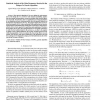17 search results - page 1 / 4 » Theoretical analysis of rank-based mutation - combining expl... |
GECCO
2008
Springer
13 years 6 months ago
2008
Springer
We show how and why using genetic operators that are applied with probabilities that depend on the fitness rank of a genotype or phenotype offers a robust alternative to the Sim...
ALIFE
2006
13 years 5 months ago
2006
An evolutionary system that supports the interaction of neutral and adaptive mutations is investigated. Experimental results on a Boolean function and needle-in-haystack problems s...
ICML
2005
IEEE
14 years 5 months ago
2005
IEEE
Several algorithms for learning near-optimal policies in Markov Decision Processes have been analyzed and proven efficient. Empirical results have suggested that Model-based Inter...
TSMC
2002
13 years 4 months ago
2002
Abstract--Most genetic algorithm (GA) users adjust the main parameters of the design of a GA (crossover and mutation probability, population size, number of generations, crossover,...
PKDD
2010
Springer
13 years 2 months ago
2010
Springer
Abstract. We present an implementation of model-based online reinforcement learning (RL) for continuous domains with deterministic transitions that is specifically designed to achi...

